Like many horse enthusiasts, you may occasionally wonder just how intelligent the horses in your life actually are. You maybe among the fortunate few who own a horse that is truly a breeze to train, or alternately, your mount might be what some horsemen call dull—slow to understand and comply with your requests.
Whatever the differences in your motivations might be, what clearly interests all of us is identifying those qualities that smart horses have in common, and devising an easy, reproducible method of measuring those qualities.
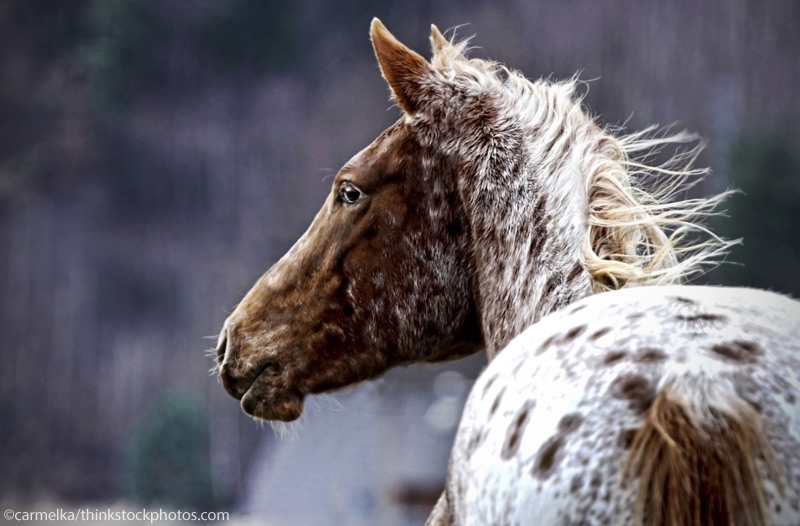
A Clever Mind
One interesting horse in my family, an Appaloosa named Denver Deuce, methodically worked for hours at opening bull-snaps and gate latches until he was free to visit other horses and raid grain rooms. His merry fun picking latches continued through several combinations of chains, snaps and latches until a padlock was finally placed on his paddock gate.
These days, he knows when the lock is not truly closed and is quick to revert to his Houdini ways whenever the opportunity presents itself. His seeming awareness of exactly what is required to free himself from his confines, coupled with the diligence with which he carries out these activities, has admittedly impressed me over the years.
Additionally, there have been other behavioral tendencies that have alerted me that the wheels might be turning a little faster than usual in Denver’s spotted head. He possesses a cunning, scheming type of play behavior that has included, among other things, slowly and deliberately nudging me face first into a moss-filled cattle water trough. He also seems to understand the vulnerability of children. Whenever a child climbs on his back, he changes from spirited riding horse to gentle and reliable mount. Frankly, there have been times when I have looked into this horse’s eyes and felt the presence of a not-quite-so-ordinary equine mind.
Trainability
The warmblood foals out of one of my hot-blooded mares exhibit intelligence of a different nature. In nearly all respects, Duchess’ foals have tended to be much more accepting of their training than their dam has been. They have been relatively easy for me to teach and load into trailers, to stand tied for bathing and clipping, and to longe, ground-drive and start under saddle. They have exhibited a type of accepting, compliant behavior which makes them easy to train, and at least superficially, this appears to be something different than the quick-minded variety of intelligence Denver Deuce displays.
Considering how many different qualities we label as intelligent behavior, we need to determine exactly what behavioral tendencies make a horse a quick and uncomplicated training prospect, and whether they correlate to a behavioral demeanor we can watch for in horses in general.
Intelligence is difficult, if not impossible, to quantify in a species whose language we cannot understand because actions alone cannot explain the logic or awareness behind them.
On the other hand, learning ability, or trainability, can be measured by trying to quantify the time it takes the horse to learn tasks or solve problems. This may seem like a trivial distinction until we consider that what appears to be intelligent behavior in our horses may actually be detrimental behavior for their wild relatives.
Intelligence vs. Learning Ability
Intelligent behavior for horses may be entirely at odds with the purposes of their riders. For example, spooking and bolting at frightening objects is a smart response for these prey animals to make in the wild, but humans require that horses learn to overcome such self-serving behavior to better suit our purposes.Our interest appears to be not so much in determining the actual intelligence of horses, but rather in their aptitude for quickly and correctly learning the lessons we teach.
In behavioral science, we recognize a difference between the ability to perceive and comprehend meaning, which we call intelligence, and the willingness to comply with human expectations, which we call learning ability.
It is important to realize that a large part of what we expect horses to learn is at odds with their general nature. For example, most trainers have experienced the resistance green horses have to many of the tasks we expect of them, including standing still for clippers, crossing water on the trail and walking into horse trailers. The survival instincts of horses are, to some degree, within them all, compelling them to flee from the loud noise and vibration of the clippers, to avoid stepping into places where solid ground is not visible and to escape the trap of trailer confinement.
In order to select horses that can be easily trained to perform task contrary to their nature, and that also demonstrate the presence of a thinking mind rather than a reacting one, we must be able to identify those horses that behave differently from the flight tendencies of the species.
An excellent example of such a horse once belonged to a friend of mine. A few years back, Ellen was bringing her horses up to the barn for their evening meal when she noticed her new Quarter Horse mare was not with the others. She climbed on another horse and rode along her fence lines until she came upon the young mare. The mare’s hind leg had become ensnared in wire fencing as a result of aggressive herding and driving by one of the established geldings in the band. Judging from the horse’s condition, the leg must have been tangled in the fence for several hours, but this 3-year-old filly stood patiently on three legs, with her injured leg suspended in the wire fencing until help arrived. According to the veterinarian involved, the fact that his horse did not panic and struggle is principally what protected her from permanently debilitating tendon and vascular damage. I’m certain most of us would value such a sane and sensible disposition in the horses we trust to carry us.
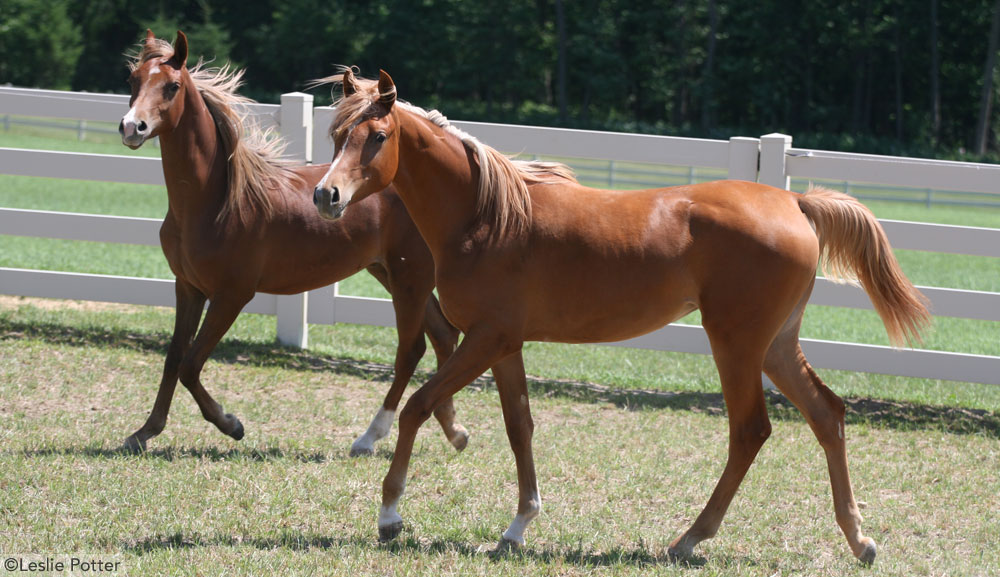
Quantifying Learning Ability
One method of measuring learning ability that has been used in many different animal species is called discrimination learning. The idea is for the animal to select the “correct” item from two or more items to earn something rewarding, such as food. The assumption is that horses which perform highest on the test are also likely to have the greatest learning aptitude outside of the testing situation. The earliest discrimination studies determined that horses could learn to make correct choices between black and white feed boxes, and this early success paved the way for more advanced studies. Another group of researchers used a discrimination test to discover that long training sessions led to inefficient learning in horses, a fact we should all remember the next time we feel compelled to work on that flying lead change yet another time to “get it right!”
One type of discrimination test, called concept formation testing, measures a horse’s ability to use early learning to solve new problems. In horse training, we expect horses to build upon prior learning to attain new levels of performance. For example, a turn on the haunch requires the horse to recognize and respond correctly to a combination of rein and leg aids presented earlier as separate and basic elements. A horse with an aptitude for forming concepts would presumably be easier to train than one lacking the ability to quickly grasp the overall training objective or “big picture.” This presumption was consistent with the results of a study I performed with a colleague in 1994, wherein the horses that were best at learning to identify triangular shapes in a discrimination test also happened to be at the top of an unofficial ranking by the campus riding instructors for training aptitude exhibited in the lesson ring.
The next study I conducted examined the relationship between the results of discrimination testing and performance on tasks we all ask horses to perform, such as crossing bridges and jumping obstacles. A visual-discrimination test was used to see if the horses could switch from “black is correct” to “white is correct” periodically to test for quick, flexible thinking. When testing was completed, the results indicated that that reversal learning tests did not correlate well with learning to jump obstacles and cross bridges, but perhaps more importantly, the study revealed that many subjects had problems making the switch to the new correct choice at color reversal time. This finding indicated that some horses have great difficulty reversing their initial training. It may be much harder to undo bad earlier experiences than we’ve all assumed. The long-term effects of early training may be more important than we ever imagined.
Building a Better Horse
Presently, behaviorists are making rapid advances in understanding learning ability in horses. However, that quick and easy method for measuring a horse’s trainability still eludes us. As long as there are breeders trying to produce the best horses possible, trainers needing to turn out polished performers as quickly as is reasonable and a horse-buying public interested in getting the most for their money, this question merits our continued efforts to find an answer. Equine enthusiasts should remember the development of this species depends on the decisions we make. As we discover ways to determine learning ability in horses, we may soon be able to accurately select for this trait in our breeding programs. For better or for worse, the future of the horse rests with us all, and it may soon be within our power to do the right thing for both the species and for ourselves, which is to produce consistently adaptable and able-minded horses.

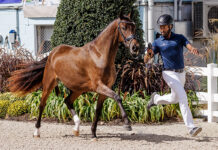
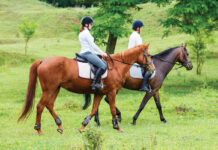
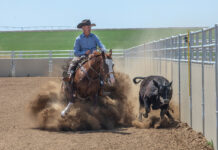

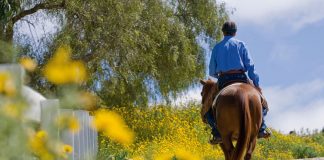
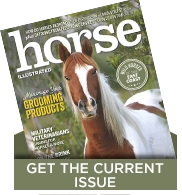
Great article, interesting and well ridden. Another example: Dolly is a 22 year old Palomino mare. She has become quite lazy. To get out of work she has concocted several ways to stop the “torture” we inflict on her. No ordinary bucking or rearing for her. Usually she will conjure up a deep belly cough, especially at the canter. Of course, we usually stop her.
Last week she ran away from me in the pasture. Not a little trot, oh no, a full blown gallop in the other direction. After 45 minutes of these shenanigans, without one cough, I realized she was fine to do lots of work. So, for two hourse we cantered from a walk, did leg yields, side passes…you name it. Another friend wanted to try her dressage test and Dolly. She moved Dolly into a posting trot and the dang horse started to limp. Barb hopped off, I got on with the dressage whip, no limp. Now, that is a smart horse.
First off I love your articles. I am not a famous or well known trainer of equines,but what I am is an everyday person with a lot of years of working with horses of my own and others in my local area that have mysteries whit there horses that need to be solved, I offer an everyday horse persons solutions that don’t cost you a fortune or the loss of your horses presents in your barn.
Now my opinion of the article, I dissagree with some of the learning abilities of your professionals, to the point in fact that most people are trying to explain why this horse learns quicker than the next, thats simple us as humans forget horses do have a thinking brain,they have to go to classes same as a human child to learn,I oppose the word Trainer try teacher.I also dissagree with the statement most horses do things for rewards like a treat or feed.I have a 10 month old filly I have started teaching life lessons for her future as a reining prospect if she chooses,I started her by(Monkey see Monkey do) so to speak.I tied the lead rope so as to make a set of reins on her halter then I stood by her side as if riding her,(now keep in mind that all dispilinies use cues and pressure of moving off your legs to perform all tasks,like lead changes,as well as directional movements)I would press my body into her side to pressure movement plus the filly shows no fear of doing this due to the fact that she has the comfort of never doing it wrong,she has my comfort and constant direction of movement with out a power struggle for either one of us,If I do it wrong then she does it wrong,but she will never know its wrong she has learned to do anything I ask and go where ever I go with out the fear of being afraid because I am always there for her,I feel horses reward or at least in my opinion is human acknowledgement just like a human likes to get the praise from there bosses of a job well done,or at least the horses I’ve worked with. I never praise a horse for what they naturally do such as walking, trotting or such,I only give praise for what they have learned or are showing the ability to try really hard to earn praise from me, that shows me they have feelings and a thinking brain.Some horses learn slower than others I feel because they are confused at the moment but given time and not to force the issue of your idea of being right from wrong they figure it out and when they do don’t take the credit for yourself give it to your horse.Has anyone ever had a horse that you have tried all day to teach them something and it just wound up in a big fight for hours and hours until you just give up and put them in the stall, then the next day you try it again and strangely they perform the task that was impossible the day before,thus the thinking brain figured it out all by itself,Now give him what he wanted all along your love and praise for a job well done,and this lesson will last a lifetime.
I thank you for this time to give my opinion on the learning ability of horses by an everyday common horse owner.I would love to answer any questions by your readers for your magazine if you would like on my everyday and life experiences of working with horses by an everyday ordinary horse person.
The article was informative and interesting. I enjoyed reading it.
Some other concepts have been studied in horses.They are:large vs small(1),hard vs soft(2), and same vs different(3).The subjects performed well in these tests. Perhaps concept tests could give a clue into a horses trainability.
(1)Equine Research Foundation Hanggi Evelyn B. (2)Lisa M. Watt and Sue McDonnell Univ. of Penn. Veterinary Medicine Equine Behavior Lab.(Equine Cognition Project Summary)2001
(3)Flannery,Barbara,1997,Relational discrimination learning in horses.
Some other concepts have been studied in horses.They are:large vs small(1),hard vs soft(2), and same vs different(3).The subjects performed well in these tests. Perhaps concept tests could give a clue into a horses trainability.
(1)Equine Research Foundation Hanggi Evelyn B. (2)Lisa M. Watt and Sue McDonnell Univ. of Penn. Veterinary Medicine Equine Behavior Lab.(Equine Cognition Project Summary)2001
(3)Flannery,Barbara,1997,Relational discrimination learning in horses.
Good.
I find concept formation in horses to be quite interesting.It shows that they really are pretty complex creatures with the ability to think.
I really liked the article.
interesting article
these are things you pick up on at your oun farm but i never realized how indepth it had been tested
thanks
good reading
interesting article.
cool.
The one thing that all you testing fails to take into account is that ALL horses are just as INDIVIDUAL as we are. They should not be “keyholed”
into conforming to test results any more than our children in schools. The GREAT trainers recognize this INDIVIDUALISM in horses and adjust their methods to each horse ….like all good school teachers do. When we LISTEN to our horses WE LEARN,
even if we learn slower than they do.
I have had my Horse for a couple of years, he is around 6 years old.I havent tried to get him jumping anything, do you think it is to late?He is a smart Horse as far as I am concerned.
Interesting…
good info
THIS ARTICLE WAS VERY WELL DONE. THE INTELLIGENCE OF MY FILLY IS WELL BEYOND WHAT I IMAGINED IT TO BE WHEN I BOUGHT HER A YEAR AND AHALF AGO.
good info
Very good article. This one is going in my book.
Excellent article!!!!! Amazing. I catched on quickly that horses tend to learn a lot more if you take it by slow patient sessions than drilling the horse to death with constant practice until he gets it right. He’ll never learn that way. He’ll be more likely to become frustrated and reluctant to participate in whatever ‘drill’ you have planned for him because he knows it’s going to be unpleasant and he’ll never look forward to it. If you just take it slowly, then he’ll enjoy it and WANT to learn more. You just have to be patient and give him time. For example, before heading straight for the arena to go about your ‘drills’ get rid of the habit and go out on a nice relaxing trail ride to ease him up. He’ll enjoy it a lot more and be more acceptable and willing to do what you ask of him. Especially if you take it slowly and be patient. Make sure to always reward him when he makes even the slightest try. THAT’S where the progress begins. ^_^
Excellent article, I relate because my horse has surprised me several times in a good way that I was not expecting. I know horse aren’t ignorant animals but some it seems are smarter in general and learn accordingly. Mine was a rescue by the way that ran barrels and other obstacles nicely while sometimes the rider was not so graceful:)
great article!
sounds like a couple horses at the stable!
Would like to know what breeds they tested and if they found any to be smarter than others. It would have been fun if a little step by step test was included that we could perform on our own horses.
I really enjoyed this article, studies on the equine mind are always so interesting
Can not wait to try some of the things on my own horses.
Sure are a lot of interesting facts.
I use clicker training (operant conditioning) on my horses as part of their training and have found that it makes them more curious and less fearful because new objects turn into treat dispensors. They are also more active participants when learning new things. You can do your own discrimination test with clicker training as well. Just charge the clicker and once they unerstand you can teach them all kinds of targeting fun. Look clicker training up on you tube it’s lots of fun!!!!
Gonna try this…
if the horse has a big jaw and is wide between the eyes and has large open flaring nostrils and eyes that are not small the horse should be smart and i could tell u more is i had my book with me but u should buy the book by Linda Tellington-Jones its goooood
Very interesting article. One I will have to reread.
Good article…old, but so true!
interesting…
I agree, horses do have the the ability to learn from watching and seem to figure out how to do things on their own.
I find the horse who looks to the human for the answer is the calm one. I also find the one who trys to open the gate, feed bin and etc. I the one which seems to learn the fastest.
Interesting article! I’ve found that intelligence varies wildly from horse to horse, and for that matter the different “kinds” of intelligence. I’ve seen horses hold off on naughty behavior until they think they aren’t being watched, which means they can think far enough ahead that they not only know they shouldn’t be doing the behavior in front of that person, but know that sooner or later that person is going to walk off!
I find that the naughty or mischifius horse is useually the smarter horse. We love to yell out “Stupid horse!” when we find you horse has exscaped into the barn and found out how to open the grain bin. But you try doing all the things he just did without arms, hands, thumbs or natral know-how in opening gates. For instance, my pony likes to exscape his pasture alot, he knows it can’t stop him, but he knows when I yell “JASPER!!!!” or “Git em boys!” he better get his butt back int he pastur before I or the dogs get to him. My horse Savvy is smart, but he doesn’t know that he could just walk right through the fence or even touch the fence, to him, that line is an unbreakable boundry and it is simply impossable to cross. Neither one is dumb, but Jasper tends to put two and two together much easier. Fence not electric+Good food on other side= EXSCAPE!
This is so interesting!I have always wondered about this.